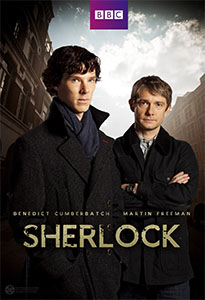 I’m generally a fan of Sherlock (the modern reimagining of Sherlock Holmes by Steven Moffatt and Mark Gatiss that’s so ubiquitous I’m just going to assume you know about it). I have some rather lengthy thoughts on how Moffat’s handling of Doctor Who has gone off the rails that I may spew across the Alexandrian at some point, but Sherlock has managed to mostly avoid those problems.
I’m generally a fan of Sherlock (the modern reimagining of Sherlock Holmes by Steven Moffatt and Mark Gatiss that’s so ubiquitous I’m just going to assume you know about it). I have some rather lengthy thoughts on how Moffat’s handling of Doctor Who has gone off the rails that I may spew across the Alexandrian at some point, but Sherlock has managed to mostly avoid those problems.
Mostly.
Unfortunately, there’s a real danger that the problems Sherlock is currently laboring under could turn into a metastatic cancer on the series (as evidenced by Doctor Who).
Let’s first consider the decision to simply not resolve the cliffhanger at the end of the second series. The ambiguity they attempted to embrace is arguably interesting, but it’s a burnt earth approach to writing: They presented a seemingly insoluble puzzle, implied that the solution to it would be amazing, and then deliberately failed to deliver. Fair enough. But that means the one thing that won’t be effective again is hanging a cliffhanger on a seemingly insoluble mystery: No one is going to take it seriously because you’ve already made it clear you have no intention of providing a satisfactory conclusion.
And yet what do they do literally three episodes later? Present the exact same cliffhanger a second time, but this time featuring a different character.
That would be lazy and uninspired writing at the best of times. But it’s particularly anemic because they’ve already established that they have no intention of following through.
Fool me once, shame on you. Fool me twice, I stop watching your show.
The more insidious problem, however, is the sloppy writing in the third series. (Exactly the sort of sloppy writing that we’ve been seeing a lot of over in Doctor Who.) A key example is the end of the season finale: It depends entirely on Magnussen failing to search them for weapons, despite the fact that the episode explicitly established that Magnussen has everyone he meets with searched for weapons. (It’s particularly silly because the only thing establishing Magnussen’s paranoia about weapons accomplishes is to render the ending of the episode into nonsense.)
In order for Sherlock to work as a series, it has to deliver sharp, clever scripts that support the conceit that its main character is sharp and clever. If it stops doing that it’s going to die a quick death, no matter how sexy and talented its two main stars may be.













I think you hit the nail on the head. The third season was sloppy compared to the first two. Something about the end of the last season had bothered me and I couldn’t put my finger specifically on what it was but the failure to search them for weapons explains it. Good catch!
I also feel like the Magnussen and Watson stories seemed rushed and poorly handled. I would like to have seem more time put into them.
The cliffhangers, for me at least, are POTENTIALLY problematic, but not necessarily so. I could see them resolving both together in an interesting and satisfactory manner; intertwining the mysteries of how they both survived just as the two characters are intertwined. If they don’t, then any interest and enjoyment generated by the first (which there was for me) is lost.
Out of curiosity (since it has been a while since I’ve watched it) what other issues did you see with the third season?
Agreed, if you are going to be clever in your writing but clever, but do not boast about being clever and then fail to deliver.
And I do not like the Moriarty of the series at all, so seeing him back was annoying on an additional level for me.
Failing to deliver the answers to blatant mysteries is a great short term tactic, but man does it cost you in the end. The ABC drama Lost still stands as a shining example of how you can build a huge audience in the near run, and gradually lose that audience as they figure out your little trick until you are remembered not for the early high quality but for the late run disappointment.
See also: Dallas’ “Who shot JR” stunt, among others.
Haven’t been watching Sherlock, but agree completely on Doctor Who. Combination of constantly reminding us the Doctor is a fictional character, and having the characters being oblivious to perfectly good solutions to problems for no reason. Would love to see your take on it, and hope you go into a lot of detail.
I like what Monkapotomus has to say about the possibility of the two cliffhangers finally being resolved in season four. Hypothetically, what do you think of tease and disappoint, then tease and satisfy as a writing trick?
I hold out a faint glimmer of hope that this might be the case. But based on interviews it sounds like they really aren’t planning to address the Sherlock thing. I guess we’ll see if that has just been an elaborate misdirection.
But if they reach the end of Series 4 without explaining either survival I can say with a very high degree of certainty that I won’t continue to watch the show. (Much as Series 8 was the final straw for Doctor Who for me.)
I would be very interested in seeing a detail critique of Dr Who. My daughter and I loved the reboot and then series 7 started to wane, and 8 was…….just screwed over. It seems like Moffatt is great at introducing really cool concepts but he and the other writers just can’t execute.
In light of the Christmas Special, The Abominable Bride, I curious if that changes your perception of the ending of Season 3?